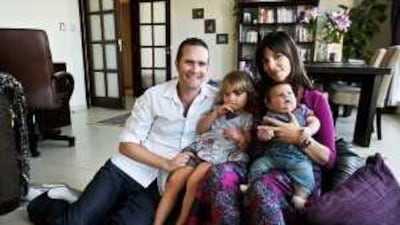ABU DHABIi // Jasmine Collin had to travel all the way from the UAE back to the UK just so she could give birth at home. Her decision meant having her baby at her mother's home after a month apart from her husband, a time the 38-year-old mother from Abu Dhabi calls the "most difficult of her pregnancy".
Having a baby at home may seem like a step back in time: just a few decades ago all babies in the Emirates were born at home because there was no option. Fans of the practice say it makes the experience of giving birth more intimate, allowing the mother to control the process instead of following doctors' orders. "It was amazing and I wouldn't have been able to have that opportunity if I was here," said Mrs Collin.
Two of Mrs Collin's friends are in the UK so that they too can have home births. "I know hundreds of women here who would like to have the option of a home birth," said Kate Greenstock, an educator and doula (non-medical childbirth assistant) in the capital. "There is a lot of misunderstanding about home birth. It is as least as safe as, if not safer than, a hospital birth." Home births are discouraged in the country because of a lack of infrastructure and personnel. Midwives in the UAE are permitted to work only in hospitals.
In many countries where home births are not discouraged, the mother must be assisted by an experienced professional, such as a midwife, who has had years of medical training. The concern is that without prompt medical intervention, complications can become catastrophes. Further, home births are not recommended for high-risk pregnancies. According to the World Health Organisation, the Emirates has 54 deaths for every 100,000 births. That is well below the average of 370 per 100,000 across the Eastern Mediterranean region but above rates in some western nations, such as five per 100,000 in Canada, and 14 per 100,000 in the US.
But even if they do not want to have their babies at home, some women in the UAE say they should be given the choice. Hamda al Mansouri, a 25-year-old Emirati, is pregnant with her first child and plans to give birth in a hospital. She said giving birth at home sounds frightening, because "we don't know what will happen to the mother". In a hospital, she said, "the doctor can act to protect her".
However, Ms al Mansouri added that "the Government needs to give women the choice". Even though Nada Mousa Alraeei's mother and grandmothers gave birth at home, the 27-year-old Emirati said that when it is her time she will choose the hospital. "Nowadays we have hospitals where it is clean and they will take care of all the things that will happen," she said. But she also endorses the idea of a mother being able to decide.
"Some families have a grandmother in the house to help," she said. "In the UAE it should be the mother's choice." Yousra Adil, a 22-year-old Emirati television presenter, would prefer to give birth at home. She said: "There is something about home birth. I think I'd say it's classical; there is a romantic thought to the idea, it's so intimate." She worries that in a hospital mothers are treated as just another patient.
"At home you feel special," she said. "This doctor is coming just for you and for your baby. Your family is around you, your husband is focused just on you and everything is about you and the baby." amcmeans@thenational.ae

